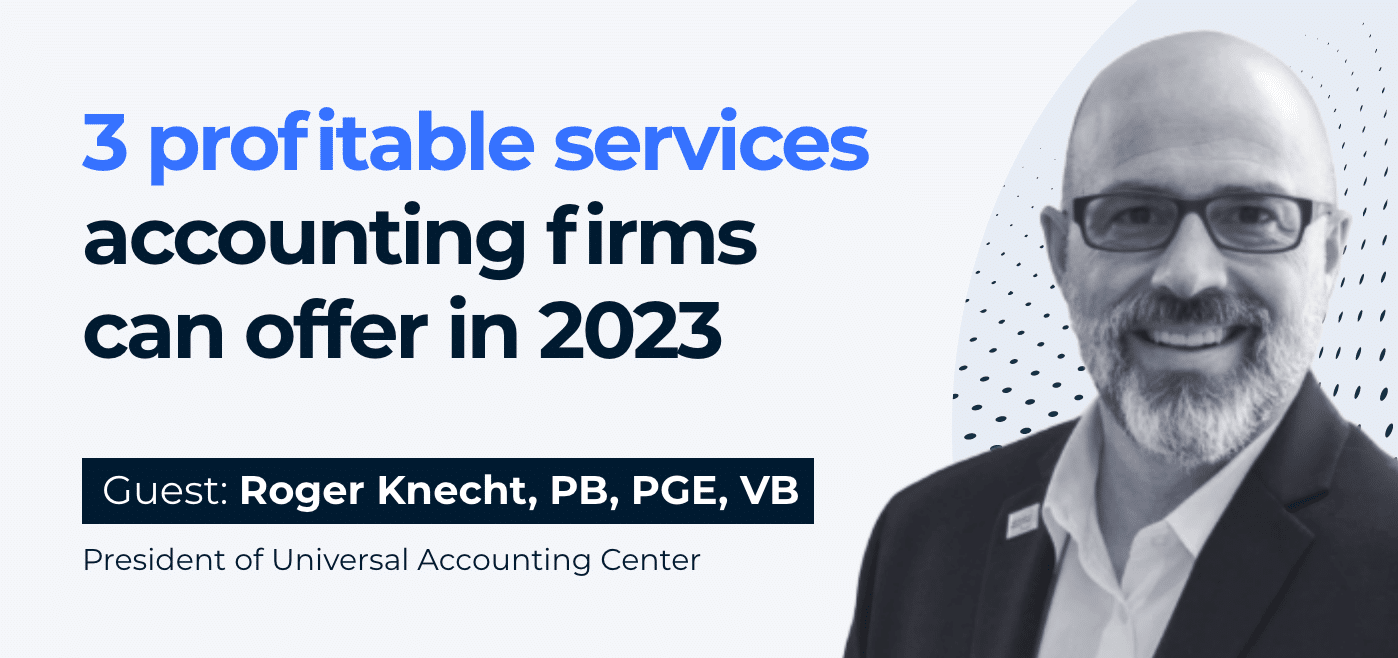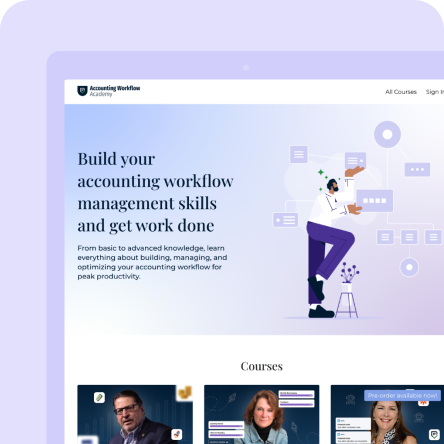Accounting firms are presented with a wealth of opportunities to expand their services and drive profitability. In an ever-evolving financial landscape, it’s crucial for firms to adapt and offer valuable solutions that meet the changing needs of businesses and individuals alike.
As a firm owner, you need to be willing to embrace technologies and implement Standard Operating Procedures within your company to systemize processes in order to ensure that the quality of work for your clients is consistent"
Roger KnechtIn this comprehensive article, we will explore three profitable services that accounting firms can offer in 2023: CFO advisory, Tax Planning, and Tax Preparation. By incorporating these services into your firm’s repertoire, you can position yourself as a trusted financial advisor and unlock new avenues of growth.
You can also watch the video below to get even more insights as shared by Roger Knecht
CFO Advisory
Imagine a growing startup that is at a critical crossroads, needing expert guidance to navigate financial complexities and optimize its operations. This is precisely where CFO advisory services come into play. As an accounting firm, offering CFO advisory services allows you to step into the role of a strategic partner, providing invaluable insights that drive sustainable growth for your clients.
Before transitioning into this space, ensure you have an effective and standardized way of managing processes which gives you time to explore advisory services"
Roger KnechtHere are the steps to consider:
Step 1: Understand Your Clients’ Needs
To offer effective CFO advisory services, it is essential to gain a deep understanding of your clients’ business. Conduct comprehensive assessments, including financial analysis, risk evaluation, and operational reviews. Engage with key stakeholders to grasp their goals, challenges, and growth aspirations. By immersing yourself in their world, you can tailor your services to their specific needs.
For example, consider a retail business experiencing declining profitability. Through careful analysis, you may identify that inefficient inventory management is a key issue. By understanding their pain points, you can develop strategies to optimize inventory turnover and enhance profitability.
Step 2: Provide Financial Analysis and Forecasting
Leverage your expertise to analyze your clients’ financial data and provide valuable insights. Identify areas for improvement, potential risks, and growth opportunities. Through financial analysis, you can uncover patterns, trends, and key performance indicators (KPIs) that drive business success.
For instance, let’s say you are advising a technology company. By analyzing their financial statements, you notice a consistent increase in research and development expenses. This observation prompts you to recommend exploring cost-saving measures while maintaining innovation, leading to improved financial performance.
In addition to analysis, accurate financial forecasting is a vital component of CFO advisory services. By forecasting future revenue and expenses, you empower your clients to make informed decisions and navigate uncertainties confidently.
If we are in the accounting space, I’d advice meeting with our clients on a monthly or quarterly basis to dive deep into the financial reports that the bookkeepers may have provided"
Roger KnechtStep 3: Develop Strategic Plans
Collaborate closely with your clients to develop robust strategic plans aligned with their goals. Assist in financial modeling, budgeting, and developing performance metrics. By becoming an integral part of their decision-making process, you foster a strong partnership based on trust and mutual success.
Consider a manufacturing company aiming to expand into international markets. By working alongside their management team, you can assess the financial feasibility of market entry strategies, develop comprehensive budgets, and establish performance benchmarks. This proactive approach helps your clients achieve their strategic objectives while mitigating financial risks.
Tax Planning
Taxes are a constant concern for businesses and individuals alike. In an era of ever-changing tax regulations, offering expert tax planning services can be a game-changer for your accounting firm. By proactively helping clients minimize their tax liabilities and maximize their financial resources, you become an invaluable asset in their journey towards financial optimization.
Every quarter, learn to ask your clients the right questions which will inform the right advice to give"
Roger KnechtStep 1: Stay Updated on Tax Regulations
To offer cutting-edge tax planning services, it is essential to stay ahead of the curve by keeping yourself abreast of the latest tax laws and regulations. Attend accounting conferences, participate in webinars, and subscribe to reliable tax resources that provide up-to-date information on tax legislation and changes. By staying well-informed, you can provide accurate and timely advice to your clients.
By staying updated, you can inform your clients promptly, allowing them to adjust their financial strategies and maximize their eligible deductions.
Step 2: Perform Tax Assessments
Conducting comprehensive tax assessments is a crucial step in effective tax planning. This involves examining your clients’ financial records, identifying potential tax-saving opportunities, and ensuring compliance with relevant tax laws.
During the assessment, you may uncover overlooked deductions, credits, or exemptions that can significantly reduce your clients’ tax burden. By analyzing their financial data, such as income, expenses, and investments, you can provide tailored recommendations that optimize their tax positions.
For instance, consider a self-employed individual who is unaware of the various deductions available to them. By conducting a thorough tax assessment, you can identify deductible expenses related to their business operations, home office, or retirement contributions, resulting in substantial tax savings.
Step 3: Develop Comprehensive Tax Strategies
Collaborate with your clients to develop comprehensive tax strategies that align with their financial goals. This involves proactive planning throughout the year, rather than scrambling during tax season.
As part of your tax strategy, consider long-term planning opportunities such as restructuring business entities, optimizing investments, or exploring tax-efficient retirement plans. By implementing these strategies, you can help your clients minimize their tax liabilities and maximize their after-tax income.
Let’s take the example of a high-net-worth individual who wishes to pass down their wealth to future generations while minimizing estate taxes. By developing a strategic estate plan that utilizes trusts, gifting strategies, and charitable contributions, you can help them achieve their objectives while minimizing the tax impact on their estate.
It is important to communicate clearly to your clients about the services they are paying for, which should also be clearly stated in your engagement letter to them"
Roger KnechtOffering comprehensive tax planning services positions your accounting firm as a trusted advisor capable of navigating complex tax landscapes and helping clients optimize their financial positions.
Tax Preparation
Tax preparation is a critical service that accounting firms have traditionally offered, and its importance continues to grow in 2023. Efficient and accurate tax preparation services not only alleviate the stress and complexity associated with tax compliance but also provide peace of mind to individuals and businesses.
Step 1: Implement Robust Practice Management Software
Investing in reliable practice management software is essential for streamlining your tax preparation services. Choose software that automates repetitive tasks, ensures accuracy, and enhances efficiency. Look for features such as data import capabilities, error-checking mechanisms, and e-filing options to streamline the process.
You may be interested in: Essential Features to Look For In an Accounting Workflow Software
Be welcoming to technology and really explore what has changed with virtual services while going out to learn new skills you need to become an expert on that platform"
Roger KnechtFinancial Cents, a reliable practice management software, proves invaluable in such situations.
This platform will give you complete visibility over your firm (at all times) while keeping your client work and team organized.
Its suite of features includes:
- A Workflow dashboard to track client work, assignees, and due dates.
- Email integration to manage and organize communication with your virtual clients. Turn emails to projects and automatically organize client emails separate from other emails.
- Client profiles to store and organize client information..
- Task Assignment to delegate to your virtual team.
- Client Vault to store sensitive information (like social security numbers, credit card information, etc.) securely.
- Client Tasks to automate data collection and cut down time spent on chasing clients for information.
- Capacity Management to see who in your team is overworking and redistribute work as necessary.
- ChatGPT integration to create workflow templates within seconds.
By leveraging technology, you can significantly reduce the time and effort required for data entry, calculations, and form generation. This enables you to focus on value-added tasks such as data analysis and client communication.
Step 2: Gather and Organize Client Information
Developing a streamlined process for gathering client information is crucial for efficient tax preparation. Create standardized questionnaires and checklists that capture all the necessary financial data required for accurate tax filing. Implement secure digital platforms to collect documents and organize client information effectively.
By providing clear instructions and guidance to your clients regarding the required documents and information, you can streamline the data collection process and ensure the completeness of the tax return.
Step 3: Prepare and Review Tax Returns
Utilize the gathered information to prepare accurate and compliant tax returns for your clients. Pay meticulous attention to detail and ensure that all relevant tax laws and regulations are followed. This includes staying updated on the latest tax forms, schedules, and instructions issued by the tax authorities.
As an accounting professional, see yourself as a translator or interpreter of information that is coming from accounting to the clients"
Roger KnechtImplement a rigorous review process to minimize errors and provide a high-quality deliverable to your clients. Conduct thorough reviews of the tax returns to ensure accurate calculations, proper documentation, and adherence to tax regulations. This step is crucial in maintaining the integrity of your tax preparation services and building client trust.
Step 4: Offer Post-Filing Support
Extend your services beyond tax filing by providing post-filing support to your clients. This includes addressing any inquiries or concerns they may have regarding their tax returns. Be responsive and proactive in assisting them with tax-related questions or issues that may arise throughout the year.
Moreover, use this opportunity to offer guidance on tax planning for the upcoming year. By providing insights into potential tax-saving strategies, estimated tax payment requirements, or changes in tax laws, you empower your clients to stay proactive and financially prepared.
For example, if a client experiences a significant life event, such as starting a business or purchasing a property, provide them with guidance on the tax implications and available deductions or credits they can leverage.
By offering comprehensive tax preparation services and post-filing support, you become a trusted partner to your clients, alleviating their tax-related burdens and helping them achieve financial peace of mind.
The Power of Client Education and Engagement
To truly excel in providing CFO advisory, Tax Planning, and Tax Preparation services, accounting firms must prioritize client education and engagement. By empowering clients with knowledge and involving them in the process, firms can enhance the value they deliver and foster stronger, more collaborative relationships.
You may be interested in: 6 Easy and Actionable Tips for Effective Client Management
1. Educating Clients on the Benefits of CFO Advisory:
Many businesses may not fully comprehend the value that CFO advisory services can bring to their operations. As an accounting firm, it is essential to educate clients on the benefits and transformative potential of CFO advisory services.
By organizing seminars, webinars, or workshops specifically tailored to educate clients about the role of a CFO advisor, you can increase their understanding and appreciation of this service. Use real-life examples and case studies to illustrate how strategic financial guidance can positively impact a business’s profitability, cash flow, and overall financial health.
Encourage open dialogues with clients, allowing them to share their pain points and aspirations. Through active listening and empathy, you can address their concerns and tailor your CFO advisory services to meet their specific needs. This collaborative approach builds trust and demonstrates your firm’s commitment to their success.
2. Engaging Clients in Tax Planning Strategies:
Tax planning is a collaborative effort between accounting firms and their clients. Engaging clients in the tax planning process can lead to more effective strategies and better outcomes.
Consider hosting interactive workshops where clients can actively participate in tax planning exercises. Break down complex tax concepts and explain the implications of various strategies in simple, relatable terms. Encourage clients to ask questions and provide real-time feedback to ensure that their unique circumstances and goals are considered.
Additionally, leverage technology to engage clients in the tax planning process. Utilize secure client portals or collaboration platforms where clients can securely upload documents, access tax planning resources, and communicate with your team. By providing clients with easy access to their financial information and progress updates, you foster a sense of transparency and involvement.
3. Empowering Clients through Tax Preparation:
Tax preparation is an opportunity to educate and empower clients to make informed financial decisions. As you prepare tax returns, go beyond the numbers and provide explanations of key tax concepts, deductions, and credits that apply to their specific situation.
Include a personalized summary or cover letter with each tax return, highlighting important insights, opportunities, and strategies for the upcoming year. Clearly communicate any changes in tax laws and regulations that may impact their financial planning.
Consider hosting post-tax season webinars or events where you share tips and best practices for organizing financial records, maximizing deductions, and preparing for future tax obligations. These educational initiatives demonstrate your commitment to your clients’ financial well-being beyond the immediate tax preparation service.
4. Ongoing Communication and Client Support:
Maintaining open lines of communication with clients throughout the year is vital to sustaining client engagement. Regularly share relevant industry updates, tax-related news, and financial planning insights through newsletters, blog posts, or social media.
Encourage clients to reach out with any questions or concerns they may have, and be proactive in providing timely responses. Consider hosting periodic check-ins or review meetings to discuss their financial goals, evaluate progress, and adjust strategies as needed. This personalized approach strengthens the client-advisor relationship and reinforces the value you bring to their financial journey.
Conclusion
In the ever-evolving landscape of accounting services, it is crucial for accounting firms to adapt and offer profitable services that meet the changing needs of their clients. CFO advisory, Tax Planning, and Tax Preparation are three such services that can propel your firm’s success.
By providing CFO advisory services, you position yourself as a strategic partner, offering valuable insights and guidance to drive sustainable growth for your clients. Through in-depth understanding, financial analysis, and strategic planning, you become an indispensable asset to their business success.
Expert tax planning services enable you to assist clients in minimizing tax liabilities and maximizing their financial resources. Staying updated on tax regulations, conducting tax assessments, and developing comprehensive tax strategies help your clients navigate complex tax landscapes while optimizing their tax positions.
Efficient and accurate tax preparation services alleviate the stress associated with tax compliance for individuals and businesses. Implementing robust tax preparation software, streamlining data collection processes, and ensuring thorough reviews contribute to providing high-quality tax preparation services.
By incorporating these three profitable services into your firm’s offerings, you establish yourself as a trusted advisor, fostering long-term client relationships and positioning your accounting firm for growth and success in 2023 and beyond.






